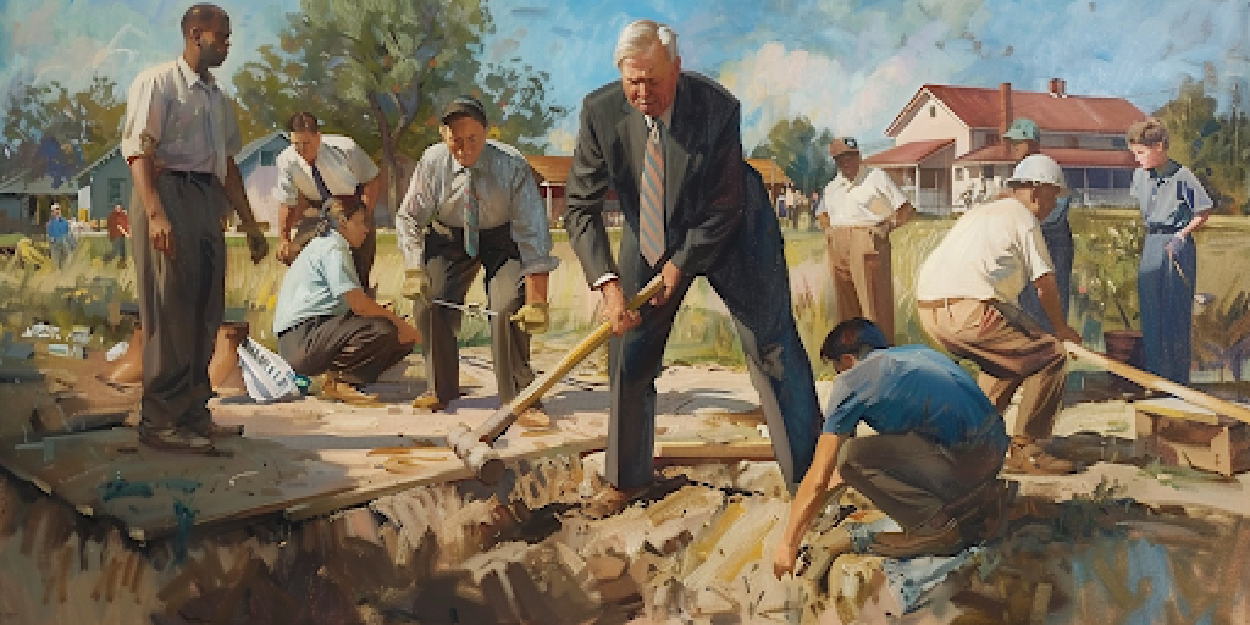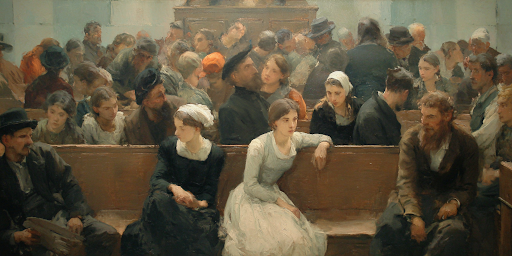Hulu’s docuseries “Mormon No More” chronicles the relationship of Lena Schwen and Sally Osborne over the course of four episodes. They meet, fall in love, divorce their husbands, and begin a relationship with each other.
Especially in our modern therapeutic age where everything can be seen through the lens of personal fulfillment and self-actualization, this trajectory of accepting and integrating a new sexual identity while leaving behind their religious identity and prior marital status is considered the height of bravery. Even though she was “as happy as I thought I could be” prior to these dramatic marriage-ending shifts, Osborne says coming to the “authentic truth” about herself has been worth it. “There’s no sense in trying to be anyone but yourself,” she says. In the trailer, they can be heard saying, “To figure out you’re gay when you’re 33 years old … sexuality is a very strange thing,” and “I get to live my truth, this beautiful feeling of fulfillment.”
Modern society treats this as a meet-cute, but really it’s the fracturing of a family. No longer are their children afforded the stability that comes with a continuing marriage between a man and a woman. Instead, those children are jointly raised by Lena and Sally and their ex-husbands. Especially in our modern therapeutic age, this trajectory of accepting a new sexual identity, while leaving behind a prior marriage and faith is considered the height of bravery.
The trailer for the series characterizes this story as one that “has not been told very much.” But let’s be real here: this is told every day. Stepping away from prior commitments and obligations to pursue “greater fulfillment” is one of the most common and widely heralded stories promoted in society today. In this sense, the Hulu series is part of a widespread genre. It also popularizes the common notion that to choose otherwise, and decide to stay in heterosexual marriages while experiencing same-sex attraction, is to be “living a lie.”
Since publicity for this series began a few months ago, I have spoken with nearly a dozen women in situations similar to Sally and Lena’s but who are making a different choice. I’m struck by stark differences with the women in this series in not only what they are experiencing—but also in how they talk about that experience.
Same Terms, Different Meanings
The Osbornes and these other women all speak of their relationships using terms like “happy,” “fulfilled,” “love,” “truth,” and even “marriage.” But the way they use each of these terms is quite different. This identity emerges, more beautiful and glorious, as she seeks to live out God’s will for her.
Love. When these other women speak of loving their spouse, it often includes deep and passionate feelings for their husbands, but it is also more than that. Myrna says love is a “deep desire for another person’s happiness, but more than a feeling, it is the act of serving and living that commitment daily.” She contrasts this love with mere romantic infatuation, which is only “about getting what you want out of the relationship,” noting that “at its root infatuation is still about how that other person makes you feel, rather than a higher level concern and care for their welfare outside of what they do for you. To me, infatuation is selfish, and love is selfless.”
Another woman, “DC,” says the commonly parroted phrase “love is love” is meaningless. What is most loving to her is love less fickle than a mere feeling (which can and sometimes does change), but one that is based on God’s universal commandments and truth. She feels the best form of love is that which shepherds herself and her loved ones to the commandments God has revealed in scripture and through modern prophets.
Truth and authentic identity. Echoing what these other women have said, Sarrah Hurst Groves adds that truth means something deeper and more universal than the way Sally and Lena use the term, who usually preface it with possessive pronouns like “my truth” and “your truth.” She believes there is only one truth, timeless and transcendent. She doesn’t want to judge others who choose differently and who may not have had, as she has had, “a powerful witness that I am to live this way.” But through her religious convictions, she has learned that “my most important identity is my spiritual identity which existed long before my physical identity, and which will exist long after it.” This identity emerges, more beautiful and glorious, as she seeks to live out God’s will for her. She adds that the witness of modern prophets is “so vital” because it provides a check on our own personal revelation, which can be influenced by others and our own powerful emotions.
Happiness. Jennifer Curtis says it is a “daily choice to be happily married to my husband of 25+ years.” While all of these women say they are happy and happily married, they often pair this term with other terms like “commitment,” “integrity,” “promise,” and “covenant.” These seem to provide them with something more meaningful and long-lasting than a feeling alone, which can fade or change. Jenn draws inspiration from William Ernest Henley’s poem “Invictus,” where “the menace of the years finds and shall find me unafraid … I am the master of my fate, I am the captain of my soul.”
Tami Thompson Wright was recently in a remarkably similar situation to the Osbournes but came to a totally different conclusion, and her explanation for why combines these three elements of identity, truth, and happiness:
Falling in love with my best friend happened to me recently, so I feel for these women. It’s been painful to disentangle myself emotionally from her. Heart-wrenching, in fact. Regardless, I feel my experiences with God within our beautiful faith are just as real and authentic as my attractions and longings for connection with someone of my gender. It really comes down to what is most important to me—and that is continuing in partnership with my amazing, loving husband in raising our children as best we can and modeling for them an authentic, real faith in God. Ben and I have had all the hard conversations that these women had with their husbands. But breaking apart our family, falling outside my covenants, and not having the daily companionship of my husband felt ultimately more painful to me than pursuing a romantic relationship with my best friend. Though incredibly painful, this experience allowed me to gain the experience I needed to accurately appreciate the incredible worth of the blessings I already enjoy with God, Ben, and our children.
I’m more grateful than ever for the beauty of familial bonds and familial love. Its value is above anything romantic, sexual love could bring. The romance and the sex will eventually dissipate—it does for all couples, whether gay, straight, or mixed—but familial love does not. And that kind of love is what I’m leaning into every day. I’ve felt the whispering of God Himself as I’ve worked in the temple, saying, “The family is of God.” I can’t ignore those singular whisperings and gentle nudges.
I stay with our faith, with Ben, with our marriage, and with our family because I am being authentic to who I am and what is most important to me.
Because of a Promise
I know something about this myself. While I continue to experience same-sex attraction, I am also married to a woman. Tanya and I recently celebrated 18 years of marriage together. Like these women, God is a very big part of our marriage as well. There is no way we would be as happy as we are without Him.
In Thornton Wilder’s Pulitzer Prize-winning play, “The Skin of Our Teeth,” the Antrobus family is facing the ravages of the Great Depression and the onset of World War II. Drafted in the tumultuous years between 1941-1943, the story might have something to offer to our present condition. If Wilder’s more famous play “Our Town” is about every town, this play is about every family.
When George Antrobus nearly leaves his wife Gladys for a younger, more attractive romantic partner, Gladys explains to him the importance of the promise of fidelity, that it’s more important even than love: “I didn’t marry you because you were perfect. I didn’t even marry you because I loved you. I married you because you gave me a promise. That promise made up for your faults. And the promise I gave you made up for mine. Two imperfect people got married and it was the promise that made the marriage. And when our children were growing up, it wasn’t a house that protected them; and it wasn’t our love that protected them—it was that promise.”
Children thrive under that security and protection. While extended family and the larger community can compensate for various misfortunes that may befall even the most loving and committed families, what I learned from the Antrobus family is that the strength of a single family reared under a committed, devoted marital bond is sufficient to maintain, renew and even rebuild an entire civilization. It is beautiful, powerful, and transcendent. It brings joy and meaning to the couple, safety and security to the children, and stability and sustainability to society as a whole. The strength of a single family reared under a committed, devoted marital bond is sufficient to maintain, renew and even rebuild an entire civilization.
George’s summation sounds like a testimony to my ears: “I know that every good and excellent thing in the world stands moment by moment on the razor-edge of danger and must be fought for—whether it’s a field, or a home, or a country. All I ask is the chance to build new worlds, and God has always given us that. And has given us voices to guide us; and the memory of our mistakes to warn us.”
I wouldn’t find higher fulfillment by abandoning my wife and children. And we shouldn’t celebrate those who do. Divorce is sometimes necessary, but it’s always a tragedy and never something to celebrate. Instead, we should celebrate those who do the daily work of staying committed to ideals higher than the intense yet ephemeral romantic and sexual feelings of the moment. If civilization is to escape “the calamities foretold by ancient and modern prophets,” it will be because enough people have kept their promises to spouses and children, like the women I interviewed.

















